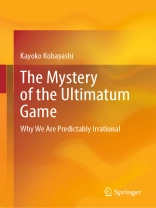This ambitious book is the first to present a theoretical framework for a unified analysis of both behavioral and traditional economics. It explores the ultimate factors from an evolutionary perspective in addressing why humans are predictably irrational and proposes ‘adaptive rationality, ‘ a new direction for understanding human behavior.
Taking anomalies in ultimatum game experiments as a starting point, this book presents findings from hundreds of experiments. The interdisciplinary nature of the book, which encompasses the latest research across an astonishingly wide range of fields—including game theory, psychology, neuroscience, cognitive science, cultural anthropology, biology, and ethology—provides boundless intellectual excitement.
While this is an academic book discussing human rationality, it can also be seen as a popular science book that delves deeply into questions such as ‘What underlies human decision making?’ The book stands out for its unique approach, making it an unparalleled reading experience. The original Japanese edition won the Nikkei Prize for Economics Books (the 64th Nikkei-Keizai Tosho Bunka award) in 2021, an accolade bestowed upon an outstanding economics book published in a given year. Furthermore, this edition also received the Takashima Kunio Jiyu Prize Encouragement Award in 2024.
Table of Content
Our demystification tool kit.- In Search of Homo Economicus.- Watching Eyes and Reputation Anxiety: Why Not Try to Take the Lot?.- We Hate Unfairness.- Ingrained in the Brain.- The Light of Evolution.
About the author
Kayoko Kobayashi is an associate professor in the Faculty of Economics, at Nanzan University, Nagoya, Japan. Having completed her doctoral studies at the Graduate School of Economics, University of Tokyo, she focuses on behavioral economics, applied game theory, and law and economics, with special interests in human decision making from an evolutionary perspective and building social systems that promote well-being for all. This book is her first solo English language publication, and the original Japanese edition of it won the Nikkei Prize for Economics Books (the 64th Nikkei-Keizai Tosho Bunka award) in 2021, an accolade awarded to outstanding economics books. This work also received the Takashima Kunio Jiyu Prize Encouragement Award in 2024. She is the mother of three loving children.












